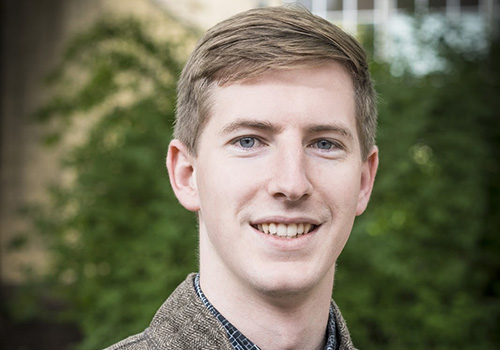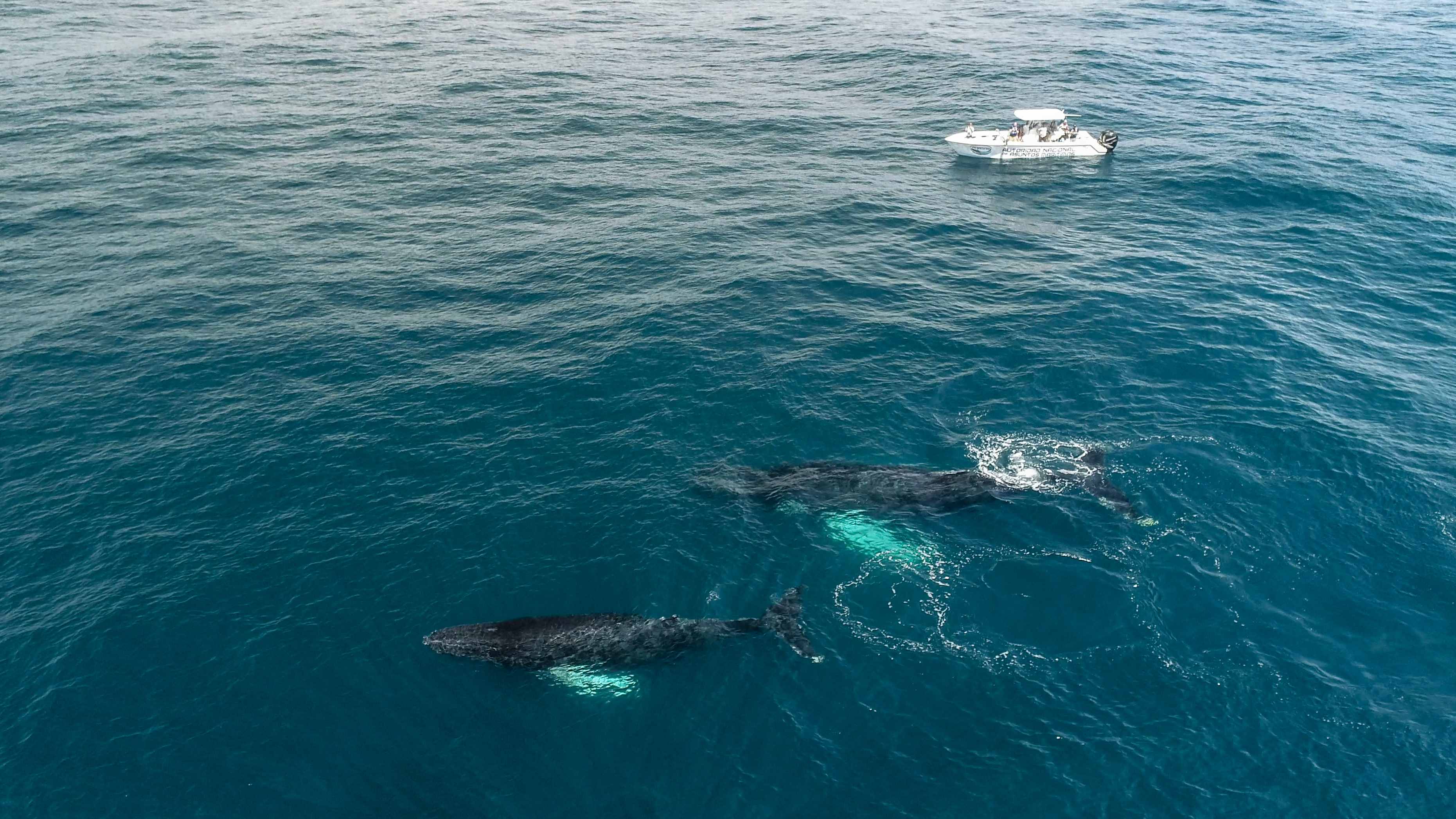
Innovating with drones: Chris Zadra
- Robotics Program Manager, Ocean Alliance, Inc. (Gloucester, MA)
- M.Eng., Technical Entrepreneurship, Lehigh University, 2017
- B.S., Applied Science (Major Focus in Computer Engineering), Lehigh University, 2016
 Chris Zadra says he’s not inherently the most social person, but he now has a great conversation starter: putting whales, drones, and snot in the same sentence gets a lot of people’s attention.
Chris Zadra says he’s not inherently the most social person, but he now has a great conversation starter: putting whales, drones, and snot in the same sentence gets a lot of people’s attention.
When did you first become interested in drones?
Growing up in southern California, I loved learning by discovery, tackling hands-on projects, and operating remote-control vehicles. These interests escalated incrementally as I grew older, and during my first year at Lehigh as an undergrad, I started building multi-rotor drones. I really enjoyed the trial and error of attempting to make something fly...literally and figuratively. I built four or five different quad-copters that first year. Looking back, I recognize that I got into the hobby at an interesting time; it was right as drones were becoming mainstream.
Your bachelor's degree was in Applied Science. Why did you decide to enter the M.Eng. in Technical Entrepreneurship (TE) program at Lehigh?
At some point over the years, in my case, anyway, it seemed that learning gradually became less about discovery and more about knowing what you need to know to pass the test. All that changed when I had the awesome opportunity to do a summer internship at Lehigh’s Mountaintop Campus that enabled students to explore an interest and learn by discovery under the guidance of a mentor. My mentor was Professor Boothe [Berrisford Boothe; Associate Professor of Art, Architecture and Design]. He saw the way I responded to this energizing environment and recommended I look at the TE program. I knew right away that I wanted to enroll.
Was it the right decision?
Definitely. It was an eye-opening, life-changing year…and by enrolling in TE, for the first time in my life I could hang a hammock in my classroom.
Are there any particular experiences you had during TE that were especially meaningful for you?
One of the first projects assigned involved building a bridge. The project guidelines triggered a lot of questions from students, but our professor just kept telling us to figure it out, leaving us to come up with our own creative interpretations. The fact that there were infinite solutions was incredibly refreshing. And, later, one of my own TE projects was an aerial photography business called Verticali. I was constantly doing research on the drone industry and market, and I'd also work on side projects in the creativity lab. Most of the other students in my TE cohort knew me as "the drone guy."
Talk about one of the skills you developed in TE.
Networking! One of the things I’m most grateful for is that Professor Lehman [Michael Lehman, Professor of Practice in TE] pushed us to build our network and go to conferences. Like I said, I’m not the most social person by nature, but now I actually enjoy new people. In this day and age, who you know can make all the difference…so networking is a very important skill.
Immediately after earning your M.Eng. in TE, you completed an internship in the U.K. What were your responsibilities?
I was a drone technician at a five-person company, DroneOps Ltd., specializing in small unmanned aerial systems and robotics. My responsibilities included programming, 3D modeling, networking, and making presentations. I was able to apply my engineering and entrepreneurial skills every day. The company functioned very much like a startup, which was great and made me realize that TE had perfectly prepared me for a quick transition into a real-world working environment.
 You went to work for Ocean Alliance in April 2018. Tell me about the company.
You went to work for Ocean Alliance in April 2018. Tell me about the company.
Ocean Alliance is a non-profit founded in 1971 dedicated to conserving whales and their environment. Our goals are to gain knowledge about whales and the ecosystem, share that knowledge through education, and protect what we’ve discovered through conservation. We own and work in a really cool property in Gloucester, MA: the Tarr and Wonson Paint Factory, built in 1863.
How did Ocean Alliance’s SnotBot program revolutionize the way information is collected from live whales in their natural environment?
In order to collect biological data in the past, scientists had to rely largely on information gleaned from whale biopsy darts. Ocean Alliance owned a large research vessel requiring a sizable crew and would travel the world doing science expeditions from the boat. The process was totally transformed in 2012 when the company launched a program called "SnotBot."
Where do drones come into the picture?
Simply put, Ocean Alliance created a drone—the "SnotBot"—to fly through the exhaled breath condensate (a.k.a. "snot") that shoots from the blowholes of whales. The resulting photographic images and DNA and hormone analyses of snot sample collections enhance our knowledge of the current health of the whales and their future on this planet. Being able to gather insights through affordable, non-invasive drone technology has been a major game changer and allowed us to downsize in a major way. Now we're able to do research expeditions almost anywhere at a fraction of the cost by hopping on a plane with a couple of drones and a box full of petri dishes. At present, the company has four full-time staff members. It feels and functions a lot like a startup even though it’s a well-known, well-connected operation.
What are your responsibilities?
Ocean Alliance recently started a program called "Drones for Whale Research," and basically my job is to manage all the projects that fall under that program, including SnotBot. I do lots of different things from day to day - everything from maintaining our drone equipment to networking with potential collaborators to fundraising to managing data to fixing leaks in the roof.
Describe the satisfaction you get from serving in this capacity.
I love going to work! Instead of serving some intangible corporate entity, I feel like I’m working for the betterment of myself, my community, and my planet…and that’s important to me. In the words of Irwin Corey, "if we don’t change direction soon, we’ll end up where we’re going." I think this is one of the most satisfying and rewarding jobs I will ever have.
How did the TE program prepare you for what you're doing now?
In TE, I learned about working in open-ended environments, juggling multiple projects at various stages of completion, having conversations with people outside of your field of expertise, building your network, creating business models, doing cost-benefit analyses, remembering that failure is always an option...and so much more.
Do you have any long-term career goals that you would want to share?
At the moment, I’m just enjoying the ride. My plan is to continue doing what I’m doing and see what new doors open. I never imagined I’d be flying drones over whales for a living, not to mention going on a SnotBot expedition to Gabon, Africa with a BBC film crew. It’s extremely exciting to think about potential opportunities that I’d never considered before.
How would you sum up the value of your TE degree?
TE was a great fit for me. During my TE year, I had the opportunity to learn by discovery, work through challenges, and acquire new skills. I had the chance to interact with interesting people and figure out the key to meeting more of them (networking!). And I had the freedom to pursue my own aerial photography and drone interests as part of our project work. In sum, the year I invested in TE provided me with the tools and the experiential learning to follow my passions and set stage for all that’s to come. What more could one ask?
